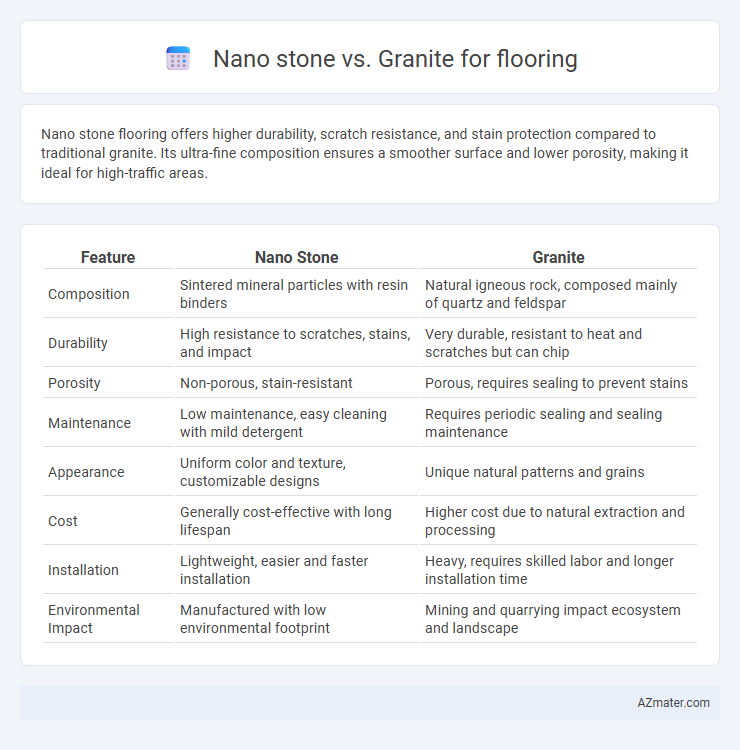Nano stone flooring offers higher durability, scratch resistance, and stain protection compared to traditional granite. Its ultra-fine composition ensures a smoother surface and lower porosity, making it ideal for high-traffic areas.
Table of Comparison
| Feature | Nano Stone | Granite |
|---|---|---|
| Composition | Sintered mineral particles with resin binders | Natural igneous rock, composed mainly of quartz and feldspar |
| Durability | High resistance to scratches, stains, and impact | Very durable, resistant to heat and scratches but can chip |
| Porosity | Non-porous, stain-resistant | Porous, requires sealing to prevent stains |
| Maintenance | Low maintenance, easy cleaning with mild detergent | Requires periodic sealing and sealing maintenance |
| Appearance | Uniform color and texture, customizable designs | Unique natural patterns and grains |
| Cost | Generally cost-effective with long lifespan | Higher cost due to natural extraction and processing |
| Installation | Lightweight, easier and faster installation | Heavy, requires skilled labor and longer installation time |
| Environmental Impact | Manufactured with low environmental footprint | Mining and quarrying impact ecosystem and landscape |
Introduction: Nano Stone vs Granite Flooring
Nano stone flooring offers a modern alternative to traditional granite with its enhanced durability, stain resistance, and ease of maintenance. Granite flooring remains a popular choice due to its natural beauty, strength, and timeless appeal in both residential and commercial spaces. Comparing the two materials highlights differences in texture, cost, and installation processes, helping homeowners make informed flooring decisions.
Composition and Material Properties
Nano stone flooring is composed of engineered materials including silica, quartz, and resin, offering superior hardness and stain resistance, whereas granite is a natural igneous rock primarily made of quartz, feldspar, and mica, known for its durability and natural variation. Nano stone exhibits enhanced uniformity and non-porous surfaces, making it highly resistant to moisture and scratches, while granite's porous nature requires sealing to prevent stains and water damage. Both materials provide excellent longevity, but nano stone's engineered composition ensures consistent performance and easier maintenance compared to the naturally variable properties of granite.
Aesthetic Appeal and Design Variety
Nano stone flooring offers a sleek, modern aesthetic with a consistent, smooth surface that enhances minimalist and contemporary spaces, while granite provides a timeless, natural appearance characterized by unique veining and a wide range of color variations. Granite's natural mineral compositions create a distinctive look in each slab, making it ideal for those seeking a bold, organic statement, whereas nano stone's engineered composition allows for precise color control and uniform patterns. Both materials offer diverse design options, but granite's inherent natural beauty and textural depth often appeal more to traditional and rustic interior designs, while nano stone suits cutting-edge, urban styles.
Durability and Strength Comparison
Nano stone offers enhanced durability due to its engineered composition, making it highly resistant to scratches, stains, and impacts compared to natural granite. Granite is renowned for its natural strength and heavy-duty wear resistance but can be prone to chipping and requires periodic sealing to maintain its toughness. Overall, nano stone provides superior long-term durability and consistent strength for flooring applications where high resilience is essential.
Maintenance and Cleaning Requirements
Nano stone flooring offers superior resistance to stains and scratches compared to granite, resulting in lower maintenance needs. Granite requires periodic sealing to maintain its durability and prevent moisture absorption, while nano stone's non-porous surface eliminates frequent sealing. Cleaning nano stone involves simple wiping with mild detergents, whereas granite demands specialized cleaners to preserve its natural finish and prevent dullness.
Installation Process and Costs
Nano stone flooring features a straightforward installation process with lightweight panels that reduce labor time and require minimal adhesive, making it a cost-effective choice. Granite flooring installation involves heavy slabs that necessitate specialized equipment and skilled labor, leading to higher installation expenses. Overall, nano stone offers lower upfront installation costs and faster completion compared to the durable but more costly granite flooring.
Resistance to Stains and Scratches
Nano stone flooring offers superior resistance to stains and scratches due to its dense surface and advanced nanotechnology, making it less porous and easier to maintain than granite. Granite, while naturally hard and durable, can be prone to staining and scratching if not properly sealed and maintained regularly. Choosing nano stone enhances long-term flooring durability and preserves appearance in high-traffic areas with minimal upkeep.
Environmental Impact and Sustainability
Nano stone flooring offers a more sustainable option compared to granite due to its lower energy consumption during production and the use of recycled materials. Granite extraction involves quarrying, which significantly disrupts natural habitats and generates high carbon emissions. The longer lifespan and recyclability of nano stone further reduce its environmental footprint, making it a greener choice for eco-conscious flooring projects.
Suitability for Different Spaces
Nano stone flooring offers exceptional durability and resistance to stains and scratches, making it ideal for high-traffic areas like kitchens and commercial spaces. Granite provides a natural aesthetic with superior hardness, suited for living rooms and outdoor patios where both elegance and weather resistance are desired. Both materials excel in moisture resistance, but nano stone's low porosity gives it an edge in bathrooms and humid environments.
Conclusion: Choosing the Right Flooring Material
Nano stone offers superior durability and scratch resistance, making it ideal for high-traffic areas or homes with pets. Granite stands out for its natural beauty and heat resistance, enhancing aesthetic appeal and long-term value. Selecting between nano stone and granite depends on balancing budget, maintenance preferences, and design goals for optimal flooring performance.

Infographic: Nano stone vs Granite for Flooring
 azmater.com
azmater.com